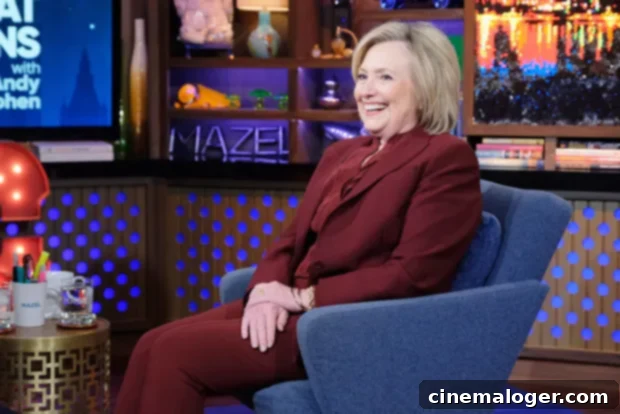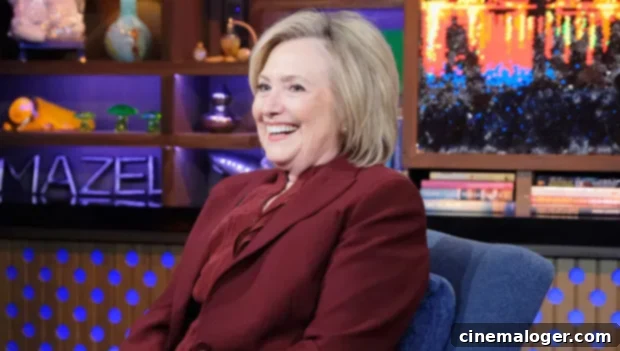Hillary Clinton Unpacks Melania Trump’s ‘Be Best’ on WWHL: A Deep Dive into Cyberbullying and Political Discourse
During a candid appearance on Bravo’s popular late-night talk show, Watch What Happens Live with Andy Cohen, former Secretary of State and First Lady Hillary Clinton engaged in an illuminating exchange that quickly captured national attention. Unlike many guests, Clinton, 72, notably declined to “Plead The Fifth” when presented with a challenging question regarding current First Lady Melania Trump‘s “Be Best” initiative. Her response, delivered with characteristic composure and a touch of subtle wit, offered a profound commentary on the complexities of public image, personal responsibility, and the often-contradictory world of political messaging in the digital age.
The pivotal moment arrived when host Andy Cohen, known for his probing questions, asked Clinton for her thoughts on Melania Trump’s widely publicized “Be Best” campaign. Without hesitation or resorting to the immunity offered by “Plead The Fifth,” Clinton provided a piece of advice – one former First Lady to another. Her guidance was succinct yet loaded with implication: if Mrs. Trump is genuinely concerned about “online incivility,” then “I think she should look closer to home.” This statement, delivered during the March 5 interview, was an unmistakable, albeit indirect, reference to President Donald Trump, whose prolific use of social media to launch personal attacks, insults, and often vitriolic rhetoric against political opponents and critics, including Hillary Clinton herself, has been a defining characteristic of his public persona and presidency.
The ‘Be Best’ Campaign: A Closer Look at Its Aims and Criticisms
Launched in May 2018, Melania Trump‘s “Be Best” initiative was designed as a comprehensive children’s wellness campaign with three core pillars: well-being, social media use, and opioid abuse. The campaign aimed to promote healthy habits, responsible online behavior, and combat the devastating effects of the opioid crisis among youth. While the goals themselves were broadly lauded as admirable and important, the campaign, particularly its focus on cyberbullying, faced immediate and persistent criticism. Many observers found it challenging to reconcile the First Lady’s advocacy for respectful online conduct with her husband’s highly publicized and often inflammatory tweets and online remarks. This apparent disconnect led to frequent mockery and accusations of hypocrisy from various media outlets, political commentators, and the general public, creating a significant PR challenge for the initiative.
Despite the considerable backlash, Melania Trump consistently defended her commitment to “Be Best.” At the time of the campaign’s launch and in subsequent statements, she acknowledged the criticism but asserted her dedication to the cause. “It is not news or surprising to me that critics in the media have chosen to ridicule me for speaking out on this issue and that’s okay,” she stated, adding that as a mother to 13-year-old Barron Trump, she remained deeply committed to “tackling this topic because it will provide a better world for our children.” Her unwavering stance underscored the challenges faced by public figures attempting to champion significant social issues, especially when their personal or familial context is perceived to contradict the very principles they advocate. However, the consistent flow of controversial tweets from her husband continued to overshadow and undermine the campaign’s message, creating an ongoing tension that proved difficult to resolve.
President Trump’s Digital Footprint and the ‘Be Best’ Contradiction
The perceived irony inherent in the “Be Best” campaign was largely fueled by President Donald Trump‘s consistent and often aggressive online behavior. His Twitter account, in particular, became a primary vehicle for engaging in what many described as cyberbullying, frequently targeting individuals from political rivals and journalists to celebrities and even foreign leaders. This pattern of behavior created a stark contrast with his wife’s call for civility and respect online, making it difficult for the public to fully embrace the “Be Best” message without a sense of cognitive dissonance. Critics frequently highlighted this apparent hypocrisy, questioning how an initiative against cyberbullying could gain traction when its most prominent advocate’s spouse was a leading practitioner of such behavior.
One of the most notable instances that exemplified this contradiction occurred in December, shortly after Swedish environmental activist Greta Thunberg, then 16 years old, was named TIME Magazine’s Person of the Year, beating out President Trump. The President responded with a characteristically cutting tweet, asserting: “Greta must work on her Anger Management problem, then go to a good old fashioned movie with a friend! Chill Greta, Chill!” This public attack on a minor who was recognized globally for her advocacy ignited widespread condemnation. Thunberg, however, demonstrated remarkable poise, famously updating her Twitter bio to sarcastically reflect Trump’s words: “A teenager working on her anger management problem. Currently chilling and watching a good old fashioned movie with a friend.” This incident, among many others throughout his presidency, served as a potent example of the very online incivility that “Be Best” sought to combat, thereby reinforcing the public’s skepticism about the campaign’s genuine impact within the First Family’s own sphere.

Beyond the direct commentary on “Be Best,” Hillary Clinton also offered other memorable moments during her WWHL appearance. Ever the political strategist, Clinton showcased her lighter side by delivering a perfectly crafted Real Housewives-style tagline: “I’m neither as good or as bad as some people say.” This quip, a nod to the reality television franchise’s dramatic introductions, highlighted her ability to navigate both serious political discourse and more lighthearted pop culture references. However, when pressed on more personal matters concerning the current First Couple, Clinton opted for a strategic retreat, stating with a knowing grin, “I am the last person to comment on anybody’s relationship.” This decision to avoid delving into the intricacies of the Trump marriage underscored her seasoned political wisdom, acknowledging the fraught nature of commenting on such highly scrutinized personal dynamics while simultaneously offering a subtle insight into her perception of the situation.
The Art of the Political Soundbite: Beyond ‘Plead The Fifth’
Hillary Clinton’s willingness to address the “Be Best” campaign head-on, rather than invoking “Plead The Fifth,” speaks volumes about her media savviness and political messaging strategy. “Plead The Fifth” on WWHL is typically an opportunity for guests to evade awkward or potentially damaging questions. By choosing not to, Clinton seized the chance to deliver a pointed, yet carefully phrased, critique that resonated deeply with her base and many critics of the Trump administration. Her remark, “look closer to home,” became an instant soundbite, perfectly encapsulating the perceived hypocrisy of the First Family’s public discourse on online civility. This moment demonstrated how experienced politicians can leverage seemingly casual television appearances to reinforce their political narratives and offer nuanced, even if indirect, critiques of their opponents. It highlighted the power of an understated delivery in conveying a potent message, proving that direct confrontation isn’t always the most effective strategy for making a point in the complex arena of public opinion.
Conclusion: The Enduring Debate on Civility and Leadership
Hillary Clinton’s appearance on Watch What Happens Live and her candid comments on Melania Trump’s “Be Best” campaign transcended a mere talk show segment; it became a significant moment in the ongoing public discourse surrounding civility, leadership, and accountability in the digital age. The exchange underscored the persistent challenge faced by public figures, particularly those in leadership roles, in maintaining credibility when their actions or those of their closest associates appear to contradict the values they espouse. The “Be Best” campaign, despite its noble intentions, struggled to overcome the shadow cast by President Trump’s aggressive online persona, leading to questions about the effectiveness of such initiatives in an environment where the highest office holder frequently engages in uncivil discourse.
Ultimately, Clinton’s subtle yet impactful critique serves as a reminder of the enduring importance of consistency between words and deeds, especially for those who seek to influence public behavior and uphold ethical standards. The debate sparked by her remarks continues to highlight the complex interplay between personal responsibility, political messaging, and the pervasive influence of social media on our society. As discussions around cyberbullying, online harassment, and the conduct of public figures continue to evolve, the challenge for leaders and their initiatives will always be to bridge the gap between their stated goals and the perceived realities of their actions, ensuring that their messages resonate with authenticity and inspire genuine positive change.
